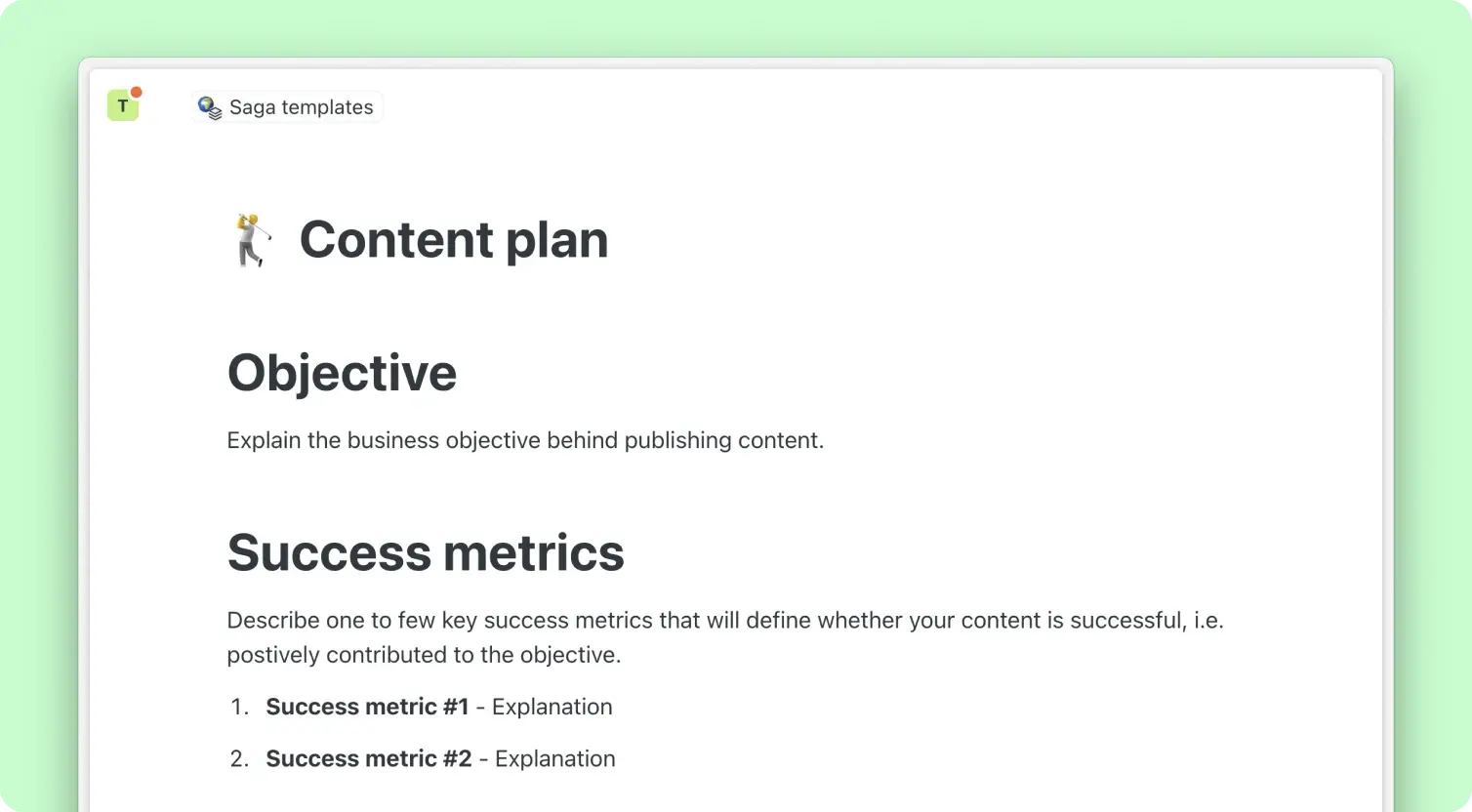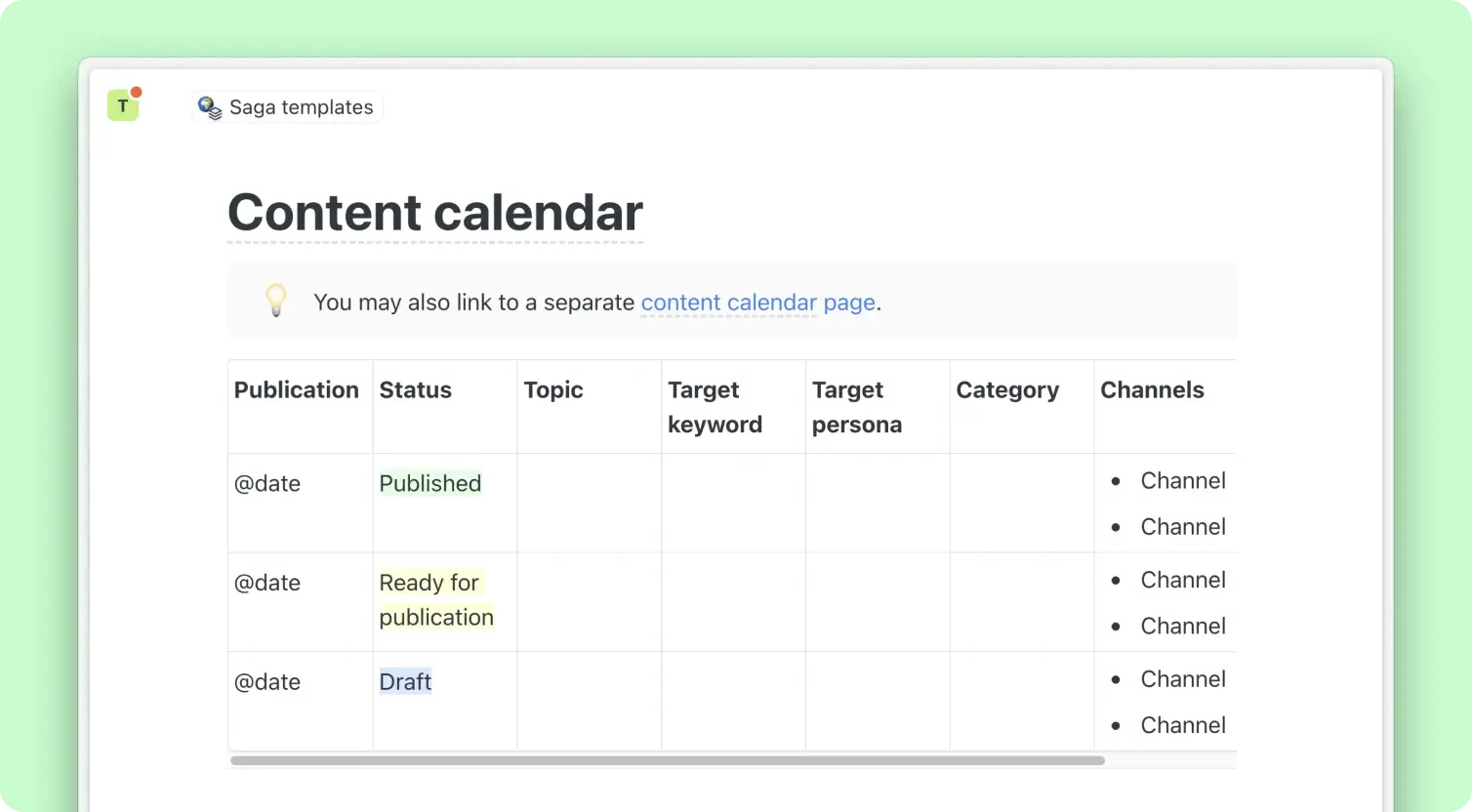Content Plan

What is a content plan?
A content plan is a strategic roadmap that outlines how you will create, publish, and manage content to achieve your business or personal objectives. It serves as a guide for your content marketing efforts, ensuring that each piece of content aligns with your goals and resonates with your target audience.
This plan includes the topics you will cover, the types of content you will produce, the channels you will use for distribution, and the schedule for publishing your content. A well-structured content plan helps in maintaining consistency and coherence in your messaging.
Unlike spontaneous content creation, a content plan is deliberate and organized, aiming to ensure that every piece of content serves a specific purpose. It involves understanding your audience’s needs, analyzing competitor content, and planning a content calendar to publish and distribute content regularly.
Having a content plan is crucial for maintaining consistency in your messaging and ensuring that your content remains relevant and valuable to your audience over time. It also helps in optimizing your content for search engines, increasing your visibility, and attracting more organic traffic.
Benefits of a content plan
Creating a content plan offers numerous benefits, starting with providing a clear roadmap for your content creation efforts. It helps in defining your brand’s voice and identity, for yourself as well as for any stakeholders you may need to involve.
It also plays a pivotal role in audience engagement and retention. A well-defined content plan ensures that your content consistently delivers value and relevance, encouraging your audience to return and engage with your posts.
Moreover, a content plan is instrumental in improving your SEO performance. By targeting specific keywords and topics that your audience is searching for, you can increase your content’s visibility on search engines and attract more organic traffic.
Finally, it serves as a benchmark for measuring the success of your content efforts. By setting clear objectives and KPIs, you can track your content’s performance over time and adjust your strategy as needed to achieve your goals.
How to create a content plan
Creating a content plan involves several key steps that help you align your content with your business or personal goals. Follow these steps to develop a comprehensive plan:
- Define your objectives: Start by identifying what you want to achieve with your content. Objectives can range from increasing brand awareness, generating leads, improving SEO rankings, to establishing thought leadership. Clear objectives will guide your content creation efforts.
- Understand your audience: Knowing who your audience is, what they need, and what interests them is crucial. Create audience personas to better understand your target readers and tailor your content to meet their needs.
- Analyze competitors: Look at what your competitors are doing. Identify gaps in their content strategy that you can exploit. This analysis can also help you find inspiration for topics and content formats that resonate with your audience.
- Plan your content: Decide on the topics you will cover, the types of content you will create (e.g., blog posts, videos, infographics), and the voice and tone of your content. Ensure that your content aligns with your objectives and audience needs.
- Create a content calendar: Organize your content creation and publishing schedule with a content calendar. This helps you maintain a consistent publication cadence, which is key to keeping your audience engaged and attracting new readers.
- Draft your content: Draft content in line with your calendar.Use AI-powered tools like Saga to help you create content- from generating ideas and structures to getting a first draft in seconds, and continue collaborating with the AI until the piece conveys your unique point of view and voice.
- Optimize for SEO: Incorporate SEO best practices into your content strategy. Research keywords that your target audience is searching for and include them in your content to improve your visibility on search engines.
- Promote your content: Don’t just publish your content; promote it across various channels. Use social media, email newsletters, and other distribution methods to reach a wider audience and drive traffic to your content. You can use Saga AI to quickly create social posts and emails to promote your content.
- Measure and adjust: Set up metrics and KPIs to track the performance of your content. Use this data to understand what’s working and what isn’t, and adjust your strategy accordingly to achieve your objectives.
By following these steps, you can create a content plan that not only meets your objectives but also resonates with your audience, ensuring the long-term success of your content efforts.

Free template for content plan
To quickly get started with developing your content plan, access our free template. It is designed to be adaptable and easy to customize, enabling you to create a detailed and effective content plan that aligns with your unique goals and audience needs.
Get started
Then click on "Copy Page" to duplicate it in your workspace.


